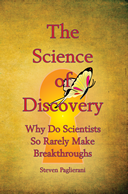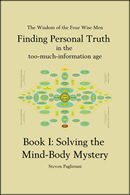Learning and Teaching as Conscious Choices
What is "learning," how does it happen, and what is a learning "disability?" What about "teaching." What is teaching and are there "teaching disabilities?" Most people, when asked these questions, struggle to come up with answers. Some respond with technical answers like that learning is a "biochemical / psychological / socio-spiritual process in which people become able identify and understand information and life." Whew! Others offer more personal answers like that learning is a painful struggle to ingest and regurgitate things they don't care about. Oddly other folks say that learning is a wonderful discovery process wherein you learn to see the beauty in life. So what makes learning wonderful for some students and so hard for others? And what happens in us when actually we learn something? What actually changes? Why does most of what we're told we've learned simply evaporate on graduation day? And why do we spend so much time learning to parrot other people's learning?
In this part of the emergence site, we explore learning and teaching; both personal and academic. We also explore how wounds impair people's ability to learn and teach, as well as some ways to heal these wounds and restore your love of learning.
Why Geniuses Aren't Always Creative (how genius and creativity are actually opposite states)
On Conscious Writing (an essay on the joys of teaching English)
On Writer's Block (can emergence help?)
On the Difficulties of Writing (the emergence of words)
On Kids Who Hate Learning to Read (introducing eventful emergence)
On Teaching English in Japan (thoughts on the implications of teaching English visually)
Are You Bad at Math? (a brief personality test)
An Emergence Practitioner's Responds to the Are You Bad at Math? Test (are you bad at math?)
The Emergence Teacher's Curriculum (an overview of what we explore, learn, and teach)
Discovering the Emergence Teacher's Perspective (learning to teach emergence)
On the Differences Between Brown Nosers and True Blue Students (an essay on being yourself in classrooms)
What do you think would happen if you were asked to come up with questions about a topic, then prevented from offering answers? In 2006, we began to explore this idea as part of a project wherein looked at the role curiosity plays in learning. We then continued to do this weekly for over a year, asking questions about everything from creating a conscious classroom and the physiology of learning to parenting with patience and questions your therapist should ask you. The result?
The "Learning By Asking Questions" Project (2006 - 2007)
Getting Children to Want to Learn to Read (learning a visual alphabet)
Reading and Five Year Olds (a few things to try)
Conventional Learning (memorize) vs. Emergence (visualize) (picturing the two ways)
Learning to Read Mentally (parroting as the "death of learning")
Learning to Read Visually (creating a visual pronunciation key)
Picturing is Learning (the two styles)
One of the questions I get asked most is why does this site exist? Except for a few book ads, I don't advertise and don't get paid. In truth, one of the main reasons this site exists is to try to make the world a little better for my having lived in it. I especially would like to make a difference as far as how children learn. This series was originally thought of as the draft for a book advocating for a move from parroted learning to discovery-based learning. And while it never made it into book form, still, the concepts and ideas may inspire you to better help children to learn.
On Saving Children From the Parrot-Making Machine (preface to this series)
Introduction (why a book about learning?)
[1] What Makes Learning Greek So Hard? (Introducing the Four States of Learning)
[2] Does Doing Something Prove We Have Learned It? (true learning vs momentum learning)
[3] Why Is It So Hard To Retain Things? (linear shapes vs fractal shapes)
[4] Momentum Learning and Linear Curriculums (emergent learning)
[5] Why Can't We Unlearn Things? (learning by extension)
[6] The Myth of Grades and Grading ("statistical error")
[7] Conformity as the Curriculum (what dictates what we learn?)
[8] Learner's Block - the Mind at a Dead Stop (permanently good things)
[9] Momentum As the Balm for Not Knowing Something (dead stops)
[10] What Makes Kids Drop Out of School - 1 (early education)
[11] What Makes Kids Drop Out of School - 2 (higher education)
[12] What Kills Our Love of Learning? - 1 (the Teachability Index)
[13] What Kills Our Love of Learning? - 2 (the Student's Responsibility)
[14] What Kills Our Love of Learning? - 3 (the Two Teachability Cycles)
[15] What Is A Student? (picturing success and failure)
[16] Accessing the Alphabet (sequentially versus randomly)
[17] Using Fractals to Test for Learning (toward realistic educational accountability)
[18] What Makes Teachers Boring (stories versus lists)
[19] Finding the Statistical Good in Schools (the good side of using statistics)
[20] Matching Kids to Teachers - 1 (the 4 Emergence "Character Types")
[21] Matching Kids to Teachers - 2 (the 4 Emergence "Social Priorities")
[22] Matching Kids to Teachers - 3 (the Positively Biased Personality Tests)
[23] Matching Kids to Teachers - 4 (the Negatively Biased Personality Tests)
[24] What Are Teachers Like On A Bad Day? (Inside the Personality Fractal - 1)
[25] How Teachers Could Manage Bad Days (Inside the Personality Fractal - 2)
[26] The Face Fractal (reading the truth in eyes)
[27] Inside the Brains of Children (the most amazing fractals of all)
[28] Brain Learning Paths (the raw material for all of personality)
[29] The Real Learning Disability (the Fussy / Fuzzy fractal)
[30] The New Education (what would learning look like?)
"A" is For Apple (problems learning to write in script)
"Bad At Math" - the Man Who Felt Nervous Around Numbers (problems learning numbers)
Kevin's Story: - the Boy Who Took 42 Years to Finish a Drawing (problems learning to draw)
Missing the "Good" in What is Said (overreacting to ordinary words)
What if I told you that the thing that kills the love of learning most was asking questions and looking for answers? In 2005, I and my small group of formal students explored the nature of classrooms in our monthly group. In part, we focused on how doing homework discourages both teachers and students. In part, we focused on how seeking answers closes the mind. Overall though, we simply wanted to learn about learning. In the process, we used emergence theory and practice to explore many parts of life.
This link leads to a list of the topics we explored. Know these questions and answers were not the focus of our study. This said, these topics are some of the more interesting in life. And if you watch how you react to what was said, you may find some of what prevents you from learning.
The Emergence Explorer Project (2005 - 2008)
Teachers and Students: "Ranges" and "Roles" (Using "Zooming" to Improve Learning)
How Learning Really Happens (The True Sequence of New Learning)
The Two Progressions of Learning ("Healthy" Learning vs. "Wounded" Learning)
Searching For the True Source of Wisdom ("Connecting" as the Only Way to Access Wisdom)



